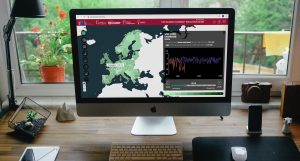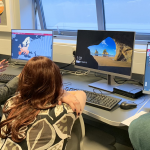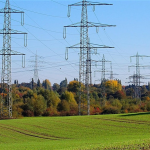WEMC Director Laurent Dubus: His hopes, history and honest opinion about the Climate Science and Energy industry
To celebrate five years of WEMC, we thought it was time we all got to know our Directors a little better. In this first interview, Laurent Dubus speaks to us about his motivations for working in the climate and energy industry, how WEMC fits in with his life and hopes for the future of the industry.
As an expert in weather and climate, Laurent has dedicated his professional career to helping international organisations integrate high-quality weather, climate and environmental information into their processes and activities. But this field isn’t one where he originally planned to work:
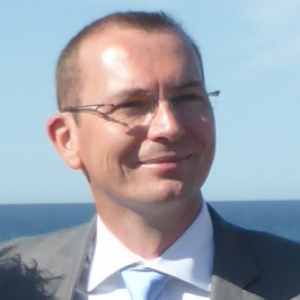 “After my PhD and post-doctorate contract in Physical Oceanography, there weren’t many opportunities in my field, and I had to deal with personal constraints too. But then EDF advertised a position to conduct research activities on the use of seasonal forecasts for power system management. The role matched my personal criteria and professional qualifications, so I decided to make the move to another field. Luckily, it was related to the environmental and earth sciences, and matched my (long-term) interest in energy applications. In the end, I moved from the ocean to the atmosphere: same equations, just a different fluid density.”
“After my PhD and post-doctorate contract in Physical Oceanography, there weren’t many opportunities in my field, and I had to deal with personal constraints too. But then EDF advertised a position to conduct research activities on the use of seasonal forecasts for power system management. The role matched my personal criteria and professional qualifications, so I decided to make the move to another field. Luckily, it was related to the environmental and earth sciences, and matched my (long-term) interest in energy applications. In the end, I moved from the ocean to the atmosphere: same equations, just a different fluid density.”
He worked with EDF R&D, one of WEMC’s Organization Members, for nearly 20 years, but he recently made a move to join RTE in Paris, France. When asked why he sought a change and how it affected his role at WEMC, he replied:
“The change was a mix of personal constrains and opportunity. EDF decided at the end of 2018 to relocate our team. As I wanted to maintain a good work-life balance without a long commute, I concluded I needed to change roles. Working at RTE means I can now cycle to the office, which is really nice! Plus, after 18 years in the same group, I think it was the right time to change.
Joining RTE did present several other advantages though. The position has been designed around my profile so I can keep working on my favourite subjects with a high degree of autonomy and with the possibility to push new projects. But RTE’s context is also different, with different problems and new fields to explore and apply my skills. This is important to me as one of my personal drivers is: learning, learning, and learning again.
But, most importantly, RTE is a public service which potentially offers even more opportunities for my work to really make an impact on decisions for the whole sector. We have a higher visibility outside of the company and this opens doors to collaboration, hopefully generating impactful studies and projects. And this is where RTE and WEMC meet: in the necessity to all work together to solve problems for the benefit of all.”
Although RTE is his main day-to-day role, WEMC remains a large part of Laurent’s life. He commented:
“I see WEMC mainly as a facilitator in the relationship between the energy industry and policy decision makers on one side, with the weather & climate community on the other. My experience in a similar position at EDF R&D shows that this kind of role is very important and can really help unlock problems in the industry. As a (modestly contributing) director of WEMC, I wish to further extend this role, to help further develop the collaborations at an international level. To initiate and take part in more innovative projects and develop new services and products in a co-design approach. Projects like C3S Energy and C3S Climate & Energy Education Demo. I think WEMC, and the amazing network it’s based on, can really provide solutions that will help with the energy transition.”
When asked which emerging sectors and innovations he found interesting and potentially beneficial for the industry, he mentioned Meteorology as one to keep an eye on.
“It’s a young science compared to physics or mathematics, but it’s been marked by a fast evolution. The last few years have been really exciting because of the science and technological advancements under the motivating pressure of the industry needs. One of the more exciting trends is around the use of Artificial Intelligence. Physics and AI have followed parallel paths but are now converging, and it’s exciting to see and explore how collaboration could help solve, or speed up, problem solving.”
Laurent reiterated the need for close collaboration in terms of problem solving. And we can’t help but think about how collaboration and problem-solving could help businesses change habits after the effects of the recent COVID-19 Coronavirus pandemic. Given the recent changes in pollution levels in China, Northern Italy and even London, we asked him about his hopes and predictions for global sustainability and the environment over the coming years.
“We are still in the crisis, so making predictions is premature, so I can only offer my hope that, with a strong political will and a good citizenship adoption of the high level decisions, humans can really change things drastically in a short period of time.
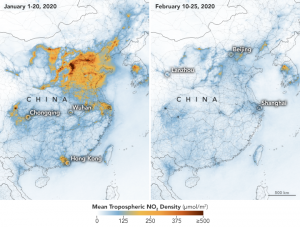
Fig. 3 – Change in No2 concentration. Source: NASA and ESA.
The strong decrease in air pollution and CO2 emissions observed since early March shows that solutions exist to solve the global problems we are facing. But our actions shouldn’t be constrained by an imminent crisis. Ideally, we should act on a commonly agreed assessment of the problems and have a long-term plan to face them. The current crisis clearly shows that the globalized World, led by economic profit purposes which only benefit a minority, is not sustainable (but who doesn’t know that?). So, my hope is that after the pandemic is over (hopefully without too many casualties), we’ll all take some time to rethink the way our societies function to draw plans for a better future.
We need to give people the tools to understand our World in an objective way, so they can make their own informed decisions. We can start with Education and multi-disciplinarity. Education, because we need a minimal level of education to make our own decision (and not just to follow influencers). And Multi-disciplinarity, because we need to consider several points of view to understand and be able to solve problems efficiently. For instance, (while I know COVID-19 is not zoonotic) I recently read a paper which showed that pandemics can be amplified by things like deforestation which puts animal habitats under pressure. This results in stressed animals which are less disease resistant as a result and are therefore more likely to spread infection.”
Just like Laurent, we hope that the population starts to consider their actions more in the coming years, and especially the younger generation who are already so active and invested in the climate, meteorology and energy fields. We asked Laurent what sort of advice he would give to these younger researchers and students looking to progress in the field.
“I’d say first gain a solid background in weather and climate, and/or energy systems. Mixed curricula in meteorology and energy are now available which wasn’t the case 10 years ago. In addition to that, I’d say the most important thing is to collaborate, and not compete. As I tried to show earlier, a multi-disciplinary approach is very important when solving complex problems. Thinking out of the box often leads to innovation. Modesty and curiosity are also good ingredients: don’t hesitate to look at how other fields are treating similar problems; you’ll always get something out of it. And last, don’t hesitate to raise your ideas, modestly but confidently. And if you fail, try again. And again. And again.”


